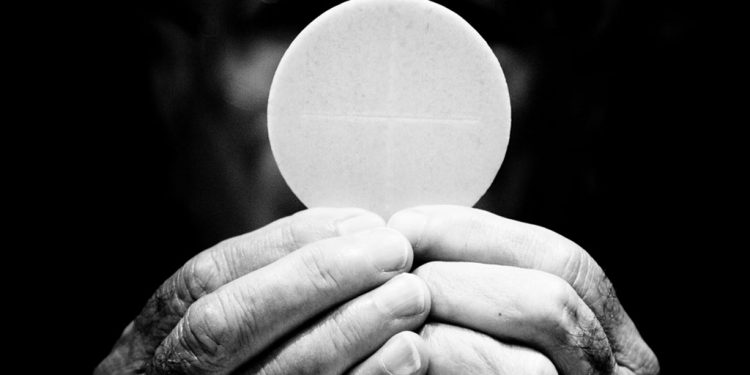Does Scripture Condemn Consuming the Blood of Jesus?

Hello Apostolic Insiders,
After 23 years as a professional Catholic Apologist, you may think I would have written on just about everything. Well, I have written and spoken on a lot of topics. But I just discovered recently one issue I have not written about. I have spoken about it, but I have not written about it. And I discovered this to be so because I recently received an email question from a Protestant fellow who asked this:
“Doesn’t Lev. 17:14 prohibit the consumption of blood? The NT hadn’t been inaugurated with the crucifixion of Christ so it would still have to apply during his discourse with Jews in John 6.”
In the process of responding to this, I discovered not only have I never written anything about this, i.e., the part about “eating blood.” But I had never even considered another aspect of this question. And that is, wouldn’t Jesus still be under the Old Covenant and so wouldn’t Lev. 17:14 apply to him and his discourse in John 6 that we Catholics use to demonstrate the truth of the Eucharist?
I will respond to both aspects of this question in five points:
1. Those asking this question about our Lord’s relationship to the Old Covenant are missing something really important. First, Jesus Christ instituted the New Covenant long before he went to the cross. In fact, according to Jesus, as my friend and colleague, Dr. Scott Hahn taught me years ago, the New Testament was a sacrament (the Eucharist) long before it was a series of books (see Luke 22:20; I Cor. 11:25). In fact, Christ was already redeeming the world through his entire life before the crucifixion because his whole life was redemptive. In that sense he was bringing us the New Covenant even from the womb of Mary.
Think about this: He was “making us rich” in grace from the moment of his incarnation (II Cor. 8:9), in his obedience to his parents in the “hidden years” (Luke 2:51-52), in his ministry of healing (Matt. 8:14-17), in his ministry of the word (John 15:3), etc. (cf. CCC 517) Don’t get me wrong, “without the shedding of blood there is no remission of sins” as Heb. 9:22 makes clear. The cross was the pinnacle of the redemption, and inaugurated the New Covenant, but again, it was Christ’s entire life that was redemptive and that also can be said to have inaugurated the New Covenant. And that redemption goes on after the cross as well. He redeemed us through his resurrection, according to Romans 4:25. And he continues his saving ministry at the right hand of the Father as well (Heb. 7:24-25; 9:28; I Tim. 2:5; Heb. 7:17-8:1-5, etc.). Thus, in his ministry of communicating the New Covenant to us in his teaching, he gives us the fullness of the truth that was only revealed “in various and partial ways” in the Old Covenant (Heb. 1:1-2). This is why Jesus could give us the definitive interpretation of the law, for example, in Matt. 15:20: “… but to eat with unwashed hands does not defile a man.” The Old Law said that it did, but Jesus takes us to a deeper level to understand what the Old Law was symbolizing. Jesus fulfilled the Old Law and inaugurates the New in his teaching just as he also did with his sacrifice on the cross.
2. Hebrews 7:11-12 tells us that Levitical law has passed away with the advent of Christ and the New Covenant law, which Jesus gives us to as “the New Moses,” especially in St. Matthew’s Gospel. Therefore, the law recorded in Leviticus 17:10-11 does not apply either to Jesus Christ or to Christians:
Now if perfection had been attainable through the Levitical priesthood (for under it the people received the law), what further need would there have been for another priest to arise after the order of Melchizadek, rather than one named after the order of Aaron? For when there is a change in the priesthood, there is necessarily a change in the law as well.
The Catechism of the Council of Trent stated, in its section on the Third Commandment: “The other Commandments of the Decalogue [except the third, or Sabbath command] are precepts of the natural law, obligatory at all times and unalterable. Hence, after the abrogation of the Law of Moses… the Commandments contained in the two tables are observed by Christians, not indeed because their observance is commanded by Moses, but because they are in conformity with nature, which dictates obedience to them.”
Christians must keep moral precepts found in the Torah only because they are also found in the natural law (Romans 1:19ff, especially 2:14-16) or in what St. Paul calls “the law of Christ” (I Cor. 9:21; Gal. 6:2). These laws, because they are in accord with natural law, cannot change. The law of Leviticus 17:10-11 was strictly disciplinary; it was not rooted in any precept of natural law.
3. A positive commandment in the New Testament always abrogates or supersedes an Old Testament commandment. For example, in Matthew 5, Jesus said over and over again: “It has been said (quoting an Old Covenant law or custom)… But I say unto you…” And Jesus then gave a new commandment in each instance (Homework! See Matt. 5:21-22, 27-28, 31-32, 33-34, 38-39 and 43-44). To use just one example for our purpose here, take a look at verses 31-32. Here, Jesus said, “It has been said…” and then references Deuteronomy 24:1 wherein Moses gave a commandment permitting divorce and remarriage. Immediately thereafter, Jesus abrogated that law in no uncertain terms. In 5:33, Jesus says, “… whoever marries a divorced woman commits adultery.”
Thus, it follows, not only has Levitical law passed away, but we have a positive commandment issued by our Lord—i.e. John 6:54: “Unless you eat the flesh of the Son of Man and drink his blood you have no life in you”—that would also nullify the previous law of Leviticus 17:10-11.
4. Some may argue at this point that the apostles commanded Gentile believers to “abstain… from blood,” in Acts 15:29; thus, making the commandment of Leviticus 17:10 a New Testament law. Actually, the context of Acts 15 reveals the Church to have issued four commandments as a compromise toward Jewish Christians who were struggling with the notion that gentiles had to become Jews and observe the Law of Moses in order to be saved. St. Peter and the apostles rejected this as what would come to be known as a “judaizing” heresy. The apostles did, however, issue four commandments for gentile converts, only one of which would concern matters of faith or morals that would be perennially binding. The apostles commanded the gentiles to “abstain from what has been sacrificed to idols and from blood and from what is strangled and from unchastity.” “Unchastity” (Gr.—porneia), would most likely refer first of all to gentile practices that were common at the time, but contrary to the moral law, e.g., incest, temple prostitution, etc., as well as that which is more commonly associated with the term, i.e., all manner of premarital and deviant sexual behavior. St. Paul would later declare in his first letter to the Corinthians that anyone guilty of these sins (under the umbrella of “porneia”), barring repentance, to be excluded from “the kingdom of God” (cf. I Cor. 6:9-10).
Yet, when we consider the dietary laws given in Acts 15, just two chapters later, after St. Paul condemned outright “porneia,” in I Cor. 6, he would refer to these other commandments from the Jerusalem Council as matters of discipline and prudential judgment: “Food will not commend us to God. We are no worse off if we do not eat, and no better off if we do. Only take care lest this liberty of yours become a stumbling block to the weak” (I Cor. 8:8-9). These last three disciplines were evidently ordered to the then present crisis in the Church. They were never intended to be permanent.
5. Let’s imagine this prohibition against “eating blood” from Lev. 17:10-11 and adopted in Acts 15:29 did apply to us today. Even so, it would not apply in the case of the Eucharist. Acts 15 (as well as Leviticus 17:10-11) refers to someone actually swallowing and metabolizing the blood of animals. We do not do this in the Eucharist. Though Christ is substantially present in the Eucharist, the accidents, or the appearances of bread and wine remain. This reality places the Eucharist in its own category neither included nor envisaged in the commandment to abstain “from blood” in either Acts or Leviticus.
And by the way, this is the essential reason the “cannibalism” claim doesn’t fly either. Catholics do not receive our Lord in a cannibalistic form. We receive him in the form of bread and wine. A simple comparison between Eucharistic communion and either the law of Lev. 17, or a cannibalistic act makes this all the more clear. The cannibal or the one “eating the blood” of animals kills his victim—Jesus does not die when we consume him. The cannibal or the one “eating the blood” of animals eats part of his victim—in communion we consume the entire Christ, body, blood, soul and divinity. The cannibal or the one eating the blood of animals sheds the blood of his victim—in Eucharistic communion our Lord gives himself to us in the context of a non-bloody sacrifice. To compare the prohibition of Leviticus or Acts to the Eucharist is like comparing apples and oranges.




